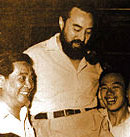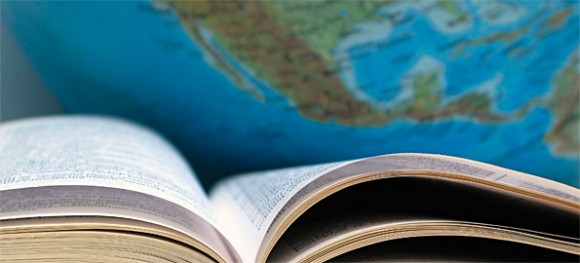NEW year, new you? Not if you’re national identity in Malaysia, it would seem. We ended last year with disputes over Article 153 provisions for bumiputera special privileges and began this one with discussions of a Race Relations Bill, hurtfully racialised statements, ethnocentric election strategising and accusations of religious subversion.

Said Zahari’s 1969 poem comes to mind: “Once again / Colour, race, religion and language/ Become sharp blades/ To use in the carnage.”
Here’s an idealistic wish for 2012: that public debate in Malaysia will stop treating our collective identity as a communitarian competition. I’m not arguing for a colour-blind society — colours are pretty. And with whatever credibility I retain after that last clause, I’ll argue that beauty is not relative. Strength need not come from comparison. Wealth may be limited, but we have enough to share.
Identity constructs
I refuse to believe that I am a minority in these beliefs. I may represent a minority religion and language within a minority race, but I grew up with comfortably multicultural social circles in national schools and never felt outnumbered until I left Malaysia for school.
This is not to suggest that those with less diverse backgrounds or stronger ethnic consciousnesses are any more or less Malaysian than I am. Our nation’s name honours our roots in Sanskrit-influenced maritime sultanates alongside our modern transoceanic federation. We don’t deserve the title “Malaysian” unless we value all the ways of being differently Malaysian.
Not that this is easy. Not least because identity is both historic and immediate, demanding generosity and rigour to avoid either trivialising or romanticising the past.

Like all national histories, ours is richly messy. I’m still in the process of learning about the mess, most recently through some brilliant books. Syed Hussein Alatas‘ The Myth of the Lazy Native (1977) taught me about the colonial origins of the ethnic stereotypes that continue to haunt us. T.N. Harper‘s The End of Empire and the Making of Malaya (1999) animated in meticulous detail the Emergency-era trauma and intergroup independence agreements caricatured in Penilaian Menengah Rendah (PMR) history textbooks.
A book I want to read next is Charles Hirschman‘s Ethnic and Social Stratification in Peninsular Malaysia (1975). Hirschman’s work on the evolution of Malaysia’s ethnic definitions was cited in Farish Noor‘s 2008 paper on the development of racial politics in Malaysia. Even a brief sample of this research tempts me to cynicism: thinking constructively about ethnicity becomes a struggle when it turns out that many of our ethnic perceptions were constructed by political opportunists, whether colonial or local.

A confused conversation
No wonder we haven’t figured out how to talk about ourselves. I’m no legal scholar, but it doesn’t take an expert to notice that the Constitution sometimes denotes Malaysia’s sub-communities as “ras, keturunan atau tempat lahir” and sometimes “kaum”, all of which have varying linguistic and ideological foundations.
Official forms today are more likely to ask for your particular “bangsa”, despite the fact that the term “kebangsaan” includes all of us. It’s not unlike the tension between calling our national language either “Bahasa Melayu” or “Bahasa Malaysia”.
This is another difficulty of affirming different Malaysian identities: some of our identities are founded on mutually irreconcilable claims. Some of these claims are primarily conceptual — for example, the friction between our Islamic heritage and our other missionary religions. Other conflicting claims involve policy problems. Affirmative action remains an open question.
Diversity in national identity
Thankfully, unity can coexist with disagreement. Understanding and respecting other perspectives does not require identical standpoints. I would like to think that a wider range of views can facilitate navigation of the unavoidably public but deeply personal territory of national and cultural identity.
My personal appreciation of the symbolic precedent of Malays in Malaysia has been informed by my appreciation of the symbolic precedent of Israel in Christianity. To some, that statement may be sacrilegious; to others, laughable. To yet others, the parallel will be recognisable but uninspiring — I’d felt similarly about a professor’s assurance that Arabic grammar was like geometry.
This array of possible reactions diminishes neither the fact that many have suffered injustice for and against Malay and Israeli sovereignty, nor my right to call myself Malaysian and Christian. But it does make exposing my identity a risk.
National unity is replete with such risks. Choosing to identify a group as large and heterogeneous as a nation is an act of reckless trust, especially in a country that offers a spectrum of smaller and thus safer identifications.

But I am encouraged in this trust by other Malaysians’ audacious expressions of nationality. Last July, thousands of netizens of all races claimed Anne Ooi as their Aunty Bersih. This past Christmas, Norhayati Kaprawi and Harakah Daily editors were among those who publicly advocated for interfaith amity.
In The Spectre of Comparisons (1998), Benedict Anderson notes that Malaysia “arose out of the last large British imperial garage sale”. I love garage sales. There’s an energetic authenticity that comes from face-to-face negotiations amid variously used treasures and trash. I would pick the exasperating but fascinating mess of our garage sale — precipitated as it was by conflict on many fronts — over the centralised gimmicks and careless labelling of a Kedai Rakyat 1Malaysia any day.
Here’s to us. ![]()
Hwa Yue-Yi is, in reverse alphabetical order, a Malaysian Christian Chinese banana.


Liumx says
While trying to solve the enigma of “reverse-alphabetical order”, I have to ponder on the identity and certainty polemic, hinted by Ludwig Wittgenstein’s On Certainty. Having read too many arguments with big names, I felt confident that Malaysians are not alone in the flux state. We live in many myths, but the grandiose of blood linage is but puzzling, the “pure” genome? Are not we all descendants of Adam the first? That is if I believe in a single source of being.
In praise of the infused Malaysia!